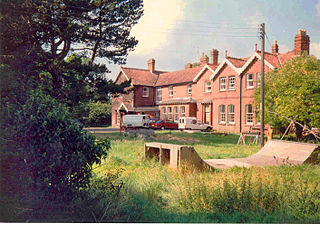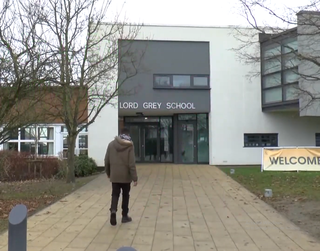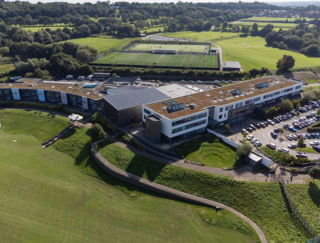
Summerhill School is an independent day and boarding school in Leiston, Suffolk, England. It was founded in 1921 by Alexander Sutherland Neill with the belief that the school should be made to fit the child, rather than the other way around. It is run as a democratic community and is considered a Democratic School; the running of the school is conducted in the school meetings, which anyone, staff or pupil, may attend, and at which everyone has an equal vote. These meetings serve as both a legislative and judicial body. Members of the community are free to do as they please, so long as their actions do not cause any harm to others, according to Neill's principle "Freedom, not Licence." This extends to the freedom for pupils to choose which lessons, if any, they attend. It is an example of both democratic education and alternative education.
Education in the United Kingdom is a devolved matter with each of the countries of the United Kingdom having separate systems under separate governments. The UK Government is responsible for England, whilst the Scottish Government, the Welsh Government and the Northern Ireland Executive are responsible for Scotland, Wales and Northern Ireland, respectively.
Alternative education encompasses educational philosophy differing from mainstream pedagogy and evidence-based education. Such alternative learning environments may be found within state, charter, and independent schools as well as home-based learning environments. Many educational alternatives emphasize small class sizes, close relationships between students and teachers and a sense of community.
The Kings of Wessex Academy, formerly known as the Kings of Wessex School, is a co-educational secondary school in Cheddar, Somerset, England. In 2015, it had 1,176 students aged 13 to 18, of both sexes and all ability levels including 333 in the sixth form. In November 2016, the academy became part of the Wessex Learning Trust which incorporated eight academies from the surrounding area. Kings is a Church of England school.

Lord Grey Academy is a comprehensive 11-19 coeducational secondary academy and sixth form in West Bletchley, Milton Keynes, England. Previously a grant-maintained foundation school and specialist language and humanities college, the school academized on 1 April 2018 under the sponsorship of the Tove Learning Trust. It was created from the amalgamation of the Bletchley Grammar School and Wilton County Secondary School in 1973, opening on the site of the latter. From 2011 to 2014 the school operated, in partnership with Sir Herbert Leon Academy, the Milton Keynes South Sixth Form. Although this sixth form was discontinued the school still provides sixth form education independently.

Harris City Academy Crystal Palace is a mixed-sex secondary school in Croydon, south London, England. It was established in 1990 to replace Sylvan High School, a newly built mixed comprehensive school which had opened in 1974. Sylvan, judged to be under-performing, re-opened as a City Technology College (CTC) sponsored by Lord Harris of Peckham. In September 2007, Harris CTC became Harris City Academy Crystal Palace.

Democratic education is a type of formal education that is organized democratically, so that students can manage their own learning and participate in the governance of their educational environment. Democratic education is often specifically emancipatory, with the students' voices being equal to the teachers'.

Mander Portman Woodward is a group of British independent schools, with branches in London, Birmingham and Cambridge, offering GCSE and A-Level courses.

Hazel Wood High School, formerly known as Broad Oak Sports College, is a coeducational 11-16 secondary school located on Hazel Avenue about a mile to the east of Bury town centre in Greater Manchester, England. It is part of the Oak Learning Partnership.

Henley Bank High School is an 11 to 18 academy in Gloucester, England. It is sponsored by the Greenshaw Learning Trust. In January 2018, the school was taken over by Greenshaw Learning Trust, in order to assist in improving aspects of the school - this resulted in a name change from Millbrook Academy to Henley Bank High School. The Headteacher is Stephen Derry supported by Executive Head and Director of School Improvement at the Greenshaw Learning Trust, Izzy Ambrose.

Newfield Secondary School is a coeducational secondary school with academy status for 11–16-year-old children, in the south of the city of Sheffield, South Yorkshire, England, in the Norton Lees area. It is co-located with Talbot Specialist School, with which it has some collaborative arrangements. There are approximately just over 1000 students at the school. In 2013 the school was sponsored to become an academy as part of its ongoing partnership with King Ecgbert School in Sheffield, with Lesley Bowes assuming the role of executive headteacher.

Brighton Hill Community School is a coeducational secondary school located in Brighton Hill, Basingstoke in the county of Hampshire in the south of England.

St Philip Howard Catholic School is an Ofsted rated "outstanding' secondary school for 11-18 year olds located between Chichester and Arundel, in the town of Barnham, West Sussex, England. It supports a strong Catholic ethos, although is open to pupils of all faiths. It holds 'Specialist Humanities College' status and 'Teaching School' status since 2017. In 2016 the school became an academy member of the BOSCO Catholic education trust.

The European Democratic Education Community (EUDEC) is a European non-profit organisation that promotes democratic education as a sensible educational model for all democratic states. EUDEC aims to further democratic education in Europe. Founded in February 2008 as a project of the United Kingdom-based Phoenix Education Trust, the organisation has been an independently registered non-profit NGO in Germany since 2009.

A democratic school refers to an alternative school that meets the following criteria:

Yaacov Hecht , is an Israeli educator and worldwide pioneer of democratic education.
The Ferrers School is a coeducational secondary school and sixth form with academy status, located in Higham Ferrers, Northamptonshire, England, UK.

The Fakenham Academy is a coeducational secondary school and sixth form located at Field Lane Fakenham, Norfolk, England. The school offers GCSEs and BTECs as programmes of study. Pupils in the sixth form can choose to study from a range of A Levels and BTECs.
Queen Elizabeth School, also abbreviated to QES, is a coeducational, comprehensive secondary school and sixth form with academy status. It is located in Kirkby Lonsdale, in the English county of Cumbria. In October 2022, it had a population of 1,170 students aged 11 to 18 in KS3 and KS4, and 186 in the sixth form.
Harris Invictus Academy Croydon is an 11–18 mixed, free secondary school and sixth form in Croydon, Greater London, England. It was established in September 2014 and is part of the Harris Federation.














